When someone you love passes away, the last thing you want to worry about is money. But funeral costs can quickly add up to thousands of dollars, and most families aren’t prepared for this sudden expense.
This guide breaks down exactly what you’ll pay for funeral services and shows you practical ways to cover these costs without adding stress to an already difficult time. You’ll learn about average prices, hidden fees to watch for, and financing options that can help you honor your loved one while protecting your family’s financial future.
How Much Funerals Actually Costs
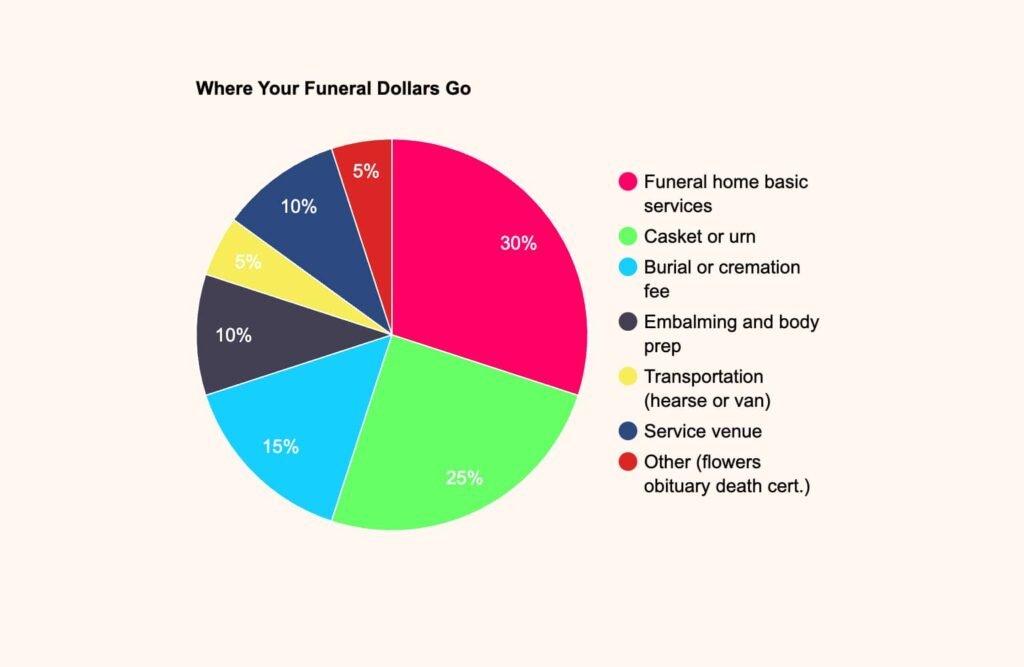
Planning a funeral when you’re grieving is hard enough. Then you get hit with all these costs you didn’t see coming.
Here’s the truth: funeral expenses come from two main places.
The funeral home handles one part – that’s the basic services, casket or urn, and staff time. Everything else happens outside – burial plots, headstones, flowers, ministers. Both parts add up fast.
Most people don’t know what to expect. That’s normal. Funeral directors should explain costs upfront, but it doesn’t always happen. This guide helps you ask the right questions and avoid surprises.
Average Funeral Costs by Type
The average cost of a funeral is $8,300 for burial and $6,280 for cremation according to recent industry data. But these numbers only tell part of the story.
Extra death certificates
Obituary placement
Cemetery plot or niche
Headstone engraving
Weekend or holiday surcharges
Transportation of body from another state
The numbers might surprise you. Here’s what families actually pay:
National Funeral Cost Breakdown:
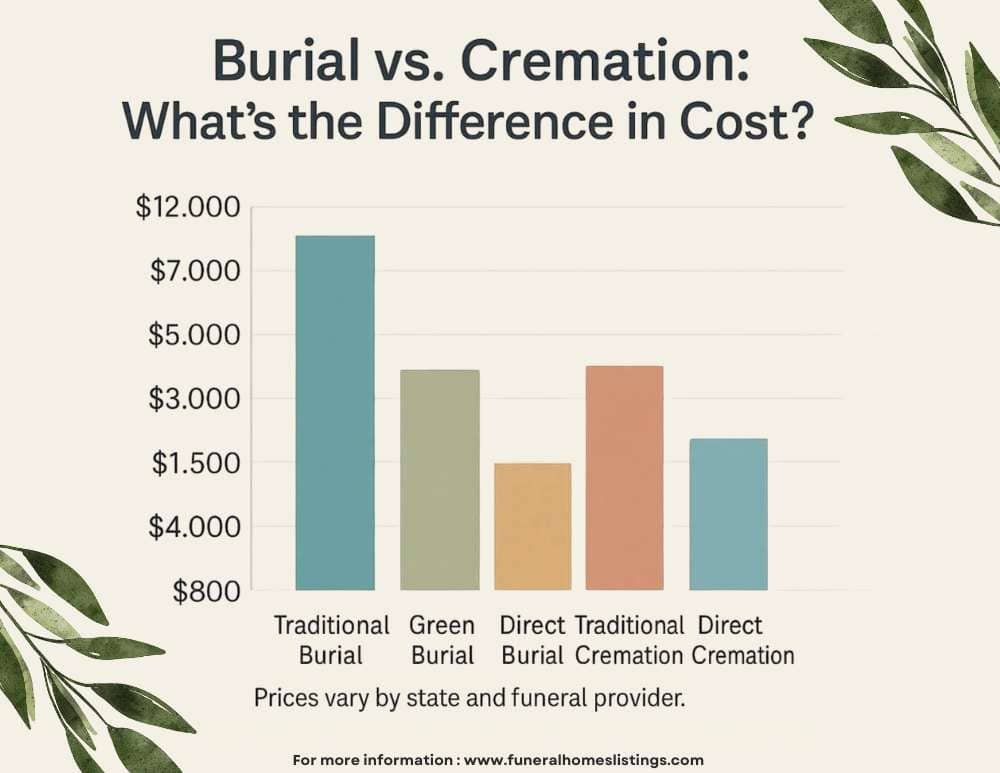
| Service Type | Average Cost | What’s Included |
|---|---|---|
| Traditional burial with viewing | $8,300 – $9,995 | Funeral home services, casket, viewing ceremony, transportation, embalming, basic materials |
| Cremation with memorial service | $6,280 | Funeral service, cremation, urn, memorial setup, embalming, transportation |
| Direct cremation | $1,000 – $3,000 | Cremation only, basic transportation, no ceremony or viewing |
| Direct burial | $2,000 – $5,000 | Simple burial, basic casket, plot fees, no viewing or formal service |
| Green burial | $2,000 – $3,000 | Simple burial, basic casket, plot fees, no viewing or formal service |
The trend is clear: more families are choosing cremation because it costs significantly less. By 2025, experts predict over 63% of families will choose cremation over traditional burial.
What Funeral Homes Must Tell You
You have rights. The Federal Trade Commission created the Funeral Rule to protect families. Funeral homes must give you a General Price List with individual prices for every service and item.
This means you can:
- See all costs upfront
- Choose only what you want
- Compare prices between funeral homes
- Say no to services you don’t need
Don’t let anyone pressure you into packages. You can buy just embalming, just the casket, or just transportation. Mix and match what works for your family and budget.
Burial and Cremation Prices
For burials:
- Caskets run $2,000 to $10,000+
- Cemetery plots cost $1,000 to $5,000
- Headstones range from $500 to $3,000
- Vault requirements add $1,000+
For cremations:
- The cremation process itself costs $300 to $1,500
- Urns range from $50 to $1,000+
- Memorial services still need venue and flowers
- Some families choose burial of ashes later
Your choices make the biggest difference in final costs. A detailed breakdown of average funeral costs shows how different funeral options between burial and cremation affect your total bill.
Breaking Down the Basic Service Fee
Every funeral home charges what’s called a “basic service fee” that you can’t avoid. This fee was $2,495 in 2023, and it covers:
- Planning your loved one’s service
- Getting permits and death certificates
- Preparing obituary notices
- Caring for the body
- Coordinating with cemeteries or crematories
You’ll pay this fee even if you choose the simplest service. The only way to avoid it completely is to handle everything yourself without using a funeral home, which is allowed in some states but requires careful research of local laws.
Merchandise Costs: The Big Expenses
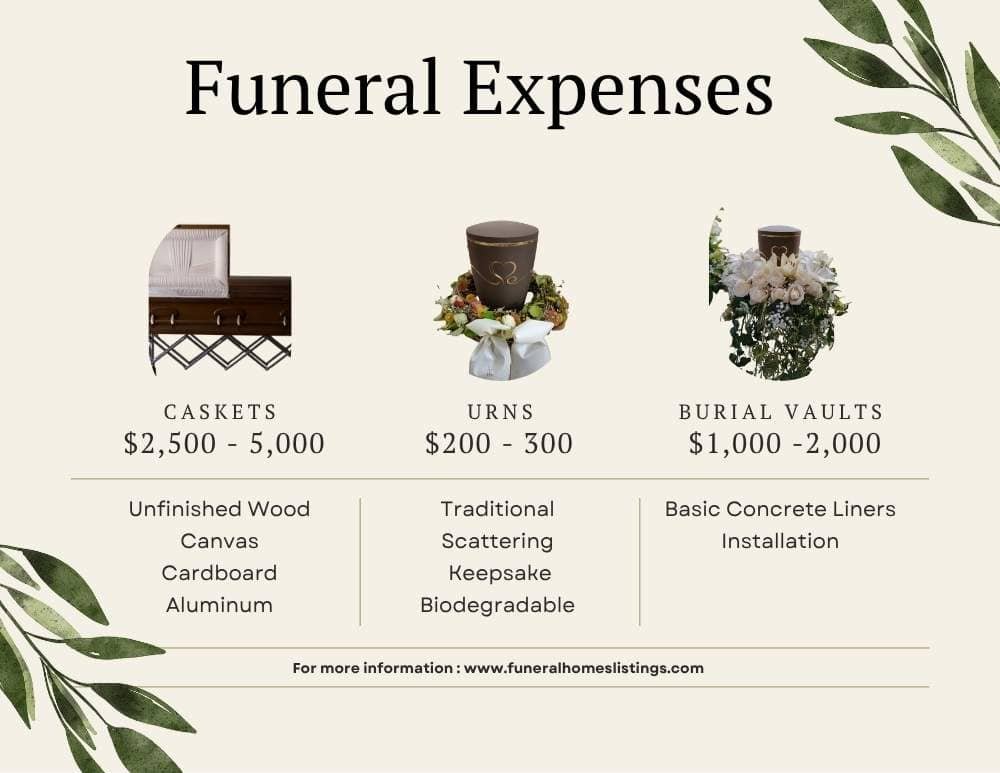
Caskets
This is often your biggest single expense. Basic caskets start around $2,000, average ones cost $2,500 to $5,000, and premium options can reach $22,000.
Here’s what helps:the Federal Trade Commission requires funeral homes to let you buy a casket from anywhere without charging you extra. You can often save hundreds or thousands by shopping around.For cremation without viewing, funeral homes must offer simple containers made of unfinished wood, cardboard, or canvas for much less money.
Urns
Cremation urns range from $30 for basic designs to over $500 for elaborate ones. The average is $295. You can choose from:
- Traditional urns for display
- Scattering urns for spreading ashes
- Keepsake urns for small portions
- Biodegradable urns that dissolve naturally
Burial Vaults and Grave Liners
This is often a surprise cost. Most cemeteries require a vault or liner to prevent the ground from sinking, even though no law requires it. Basic concrete liners cost $700 to $1,500, while premium vaults can reach $16,000. Installation adds another $500 to $1,000.
Service and Preparation Fees
Embalming
Embalming costs around $845 and is rarely required by law. Most states only require it if burial or cremation is delayed more than two days. Refrigeration is often a cheaper alternative.
Funeral homes may insist on embalming for open-casket viewings, but this is their policy, not a legal requirement. You have the right to refuse embalming in most situations.
Other Service Fees
- Viewing facility use: $450 – $475
- Funeral ceremony: $515 – $550
- Body removal and transport: $350 – $395
- Hearse: $350 – $375
- Service vehicle: $150 – $175
Third-Party Costs That Add Up Fast
Cemetery Expenses
These costs go directly to the cemetery, not the funeral home:
| Cemetery Service | Cost Range | Notes |
|---|---|---|
| Single grave plot | $1,000 – $4,500 | Varies by location and cemetery type |
| Companion plots | $3,000+ | For couples |
| Family plots | $20,000+ | Multiple graves together |
| Cremation plots | $350 – $3,000 | Smaller spaces for urns |
| Opening/closing grave | $350 – $3,000 | Digging and filling |
| Perpetual care fee | 5% – 15% of plot cost | One-time maintenance fee |
Headstones and Markers
Basic flat markers start around $200, while average headstones cost $1,000 to $3,000. High-end monuments can exceed $20,000. Installation typically adds $100 to $850.
Other Costs
- Clergy or officiant fees: $50 – $600
- Death certificates: $15 – $25 each (you’ll need multiple copies)
- Flowers: $50 – $80 per arrangement
- Obituary notices: varies by newspaper
Alternative Options That Cost Less
If traditional burial feels too expensive, you have other choices that honor your loved one while saving money.
Green Burial
Natural burial costs less than traditional burial and helps the environment. Plots typically cost $1,000 to $4,000, and biodegradable containers range from $200 to $2,000. Some complete packages are around $3,000.
Green burial avoids embalming chemicals and uses biodegradable materials, letting the body return to earth naturally.
Aquamation (Water Cremation)
This process uses water and alkaline chemicals instead of flame. It costs $1,295 to $4,600 (average $2,500) and uses 90% less energy than traditional cremation. It’s legal in over 21 states as of 2023. You can a list of states here.
Body Donation to Science
Donating your loved one’s body to medical research often costs nothing to the family. Universities and medical schools handle all disposition costs. You’ll need to make arrangements in advance, and formal funeral services aren’t typically possible.
How to Pay for Funeral Costs
Now let’s talk about the money part. You have several options, and you don’t have to choose just one.
Pre-Need Funeral Plans
These let you pay for funeral services in advance, either all at once or in monthly payments. Here’s how they work:
Types of pre-need plans:
- Revocable trust: You keep control and can access the money if needed
- Irrevocable trust: You can’t withdraw funds, but they don’t count against Medicaid asset limits
- Guaranteed plans: Lock in today’s prices
- Non-guaranteed plans: No price protection against inflation
Payment options: Single payment or monthly installments over 3 to 25 years. Monthly plans may include interest charges.
Benefits: Protection against price increases, peace of mind, ensures your wishes are followed.
IMPORTANT TIP Installment plans cost more due to interest. Plans often can’t be transferred to other funeral homes. If the plan costs more than your final expenses, you might not get the difference back.Funeral Insurance
This specialized life insurance is designed specifically for end-of-life expenses. Policies typically offer $5,000 to $50,000 in coverage.
How it works:
- People who pay out-of-pocket can usually get reimbursed from the estate
- The executor decides what counts as “reasonable”
- Accessing estate funds can be delayed by probate
- Some funeral homes will defer payment with proper legal documentation
Crowdfunding and Community Support
When immediate funds are tight, online fundraising has become common and effective.
Popular platforms: GoFundMe and FreeFunder help families raise money quickly by sharing their story online.
Benefits: Can mobilize support from friends, family, and even strangers. Works especially well for sudden deaths or families with limited resources.
Considerations: Asking for money can feel uncomfortable. Success depends on your social network and how well you tell your story.
Government Assistance
Several programs offer help, especially for veterans and low-income families.
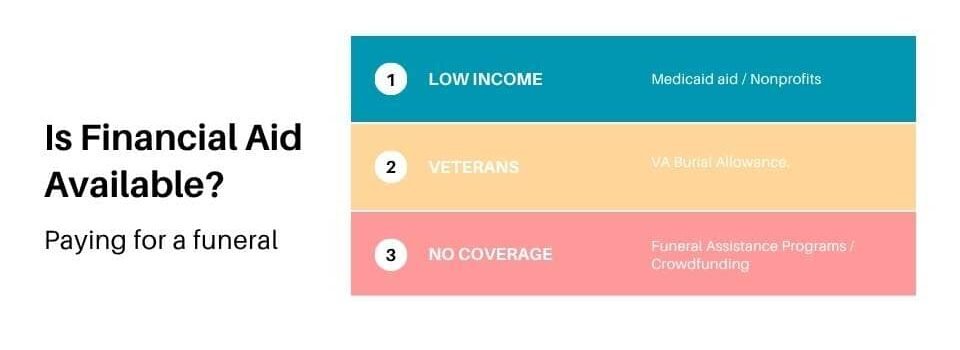
Veterans Benefits
The VA provides substantial burial benefits for eligible veterans and their families:
National cemetery burial: Completely free, including gravesite, grave liner, opening/closing, headstone, and perpetual care. Veterans also receive a burial flag and military honors.
Private cemetery allowances:
- Service-connected deaths: Up to $2,000 for burial expenses
- Non-service-connected deaths: Up to $978 for burial/funeral plus $978 plot allowance (for deaths after October 1, 2024)
Social Security Death Benefit
Provides a one-time payment of $255 to eligible surviving spouses or children. This amount hasn’t changed in decades and barely covers any funeral expenses, but every bit helps.
State and Local Programs
These vary widely by location and typically serve as a last resort for low-income families.
Eligibility usually requires:
- Income at or below 138% of federal poverty level
- Assets not exceeding $2,000
- Receipt of government benefits like Medicaid, SSI, or TANF
- Local residency
What they might cover: Basic cremation or burial services, often $1,000 to $1,700. Some counties offer indigent burial programs with simple services and basic headstones.
Examples:
- New York City: Up to $1,700
- Massachusetts: Up to $1,100 if total costs stay below $3,500
- Illinois: Maximum $1,370 for funeral, $686 for cremation/burial
- California counties: Up to $1,000 for cremation
Funeral Home Payment Plans and Financing
Many funeral homes offer payment plans to help families manage costs.
Direct Payment Plans
- Spread costs over months or years
- Some offer interest-free periods
- Often no credit check required
- Plans over 12 months may include fees
Third-Party Financing
Companies like LendingUSA, Denefits, LightStream, and SoFi offer personal loans for funeral expenses. These require credit checks and have varying terms and interest rates.
Benefits: Get the services you want without paying everything upfront. Allows for dignified ceremonies without immediate financial stress.
TAKE INTO CONSIDERATION Interest and fees increase total costs. Taking on debt during grief can add stress. Make sure you understand all terms before signing.[/su_panel]
Smart Ways to Reduce Funeral Costs
You can have a meaningful service without breaking the bank. Here are practical ways to cut costs:
Choose Direct Services
Direct burial or direct cremation skips embalming, viewing, and fancy facilities. You handle memorial services separately, often at home or in a community space. This can cut costs in half.
Shop Around
Get price lists from three funeral homes. Prices vary significantly, even in the same town. Don’t assume the most expensive place is the best.
Consider Cremation
Cremation typically costs less than burial. You avoid casket, vault, and burial plot expenses. Plus you have more flexibility with memorial services and final disposition of ashes.
Buy Smart
You can shop online for caskets and other necessitates which usually have a lower price then from the funeral home.
Handle Some Tasks Yourself
You can:
- Buy an obituary online and customize it yourself
- Provide your own flowers
- Have family members serve as pallbearers
- Hold memorial services at home or community centers
- Create photo displays and memory books
What to Watch Out For When Choosing a Funeral Home
Some funeral homes use emotional pressure to sell expensive options. They might say things like “don’t you want the best for mom?” or imply that cheaper options show less love.
That’s not true. A meaningful funeral comes from the people who attend and the memories you share, not the price tag.
Also watch for:
- Packages that include services you don’t want
- Pressure to decide everything immediately
- Claims that embalming is required (it usually isn’t)
- Expensive “protective” caskets (they don’t actually preserve bodies)
Making Decisions During Grief
You’re making big financial decisions while dealing with loss. That’s incredibly difficult. Here are some tips:
Bring a trusted friend or family member with you. They can ask questions you might forget and help you think clearly.
Don’t feel rushed. Most decisions can wait a day or two. Take time to consider your options.
Remember that this is about honoring your loved one, not impressing others. Choose what feels right for your family, not what you think others expect.
Getting Help When You Need It
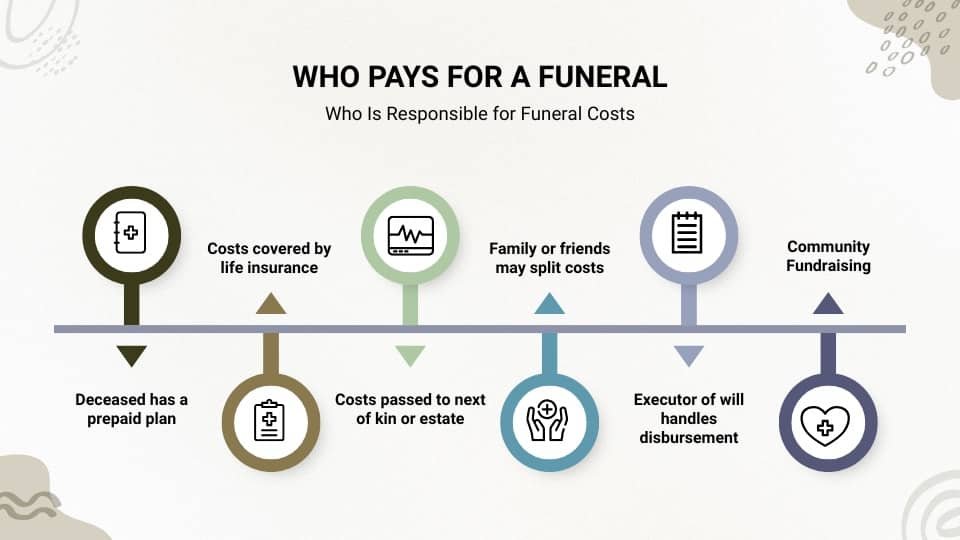
If costs feel overwhelming, don’t suffer in silence. Options exist:
- Talk to the funeral director about payment plans
- Contact veteran services if applicable
- Reach out to religious organizations
- Check with county social services
- Ask family and friends for help
Many communities have funeral assistance programs. Social workers at hospitals often know about local resources.
Understand Your Consumer Rights
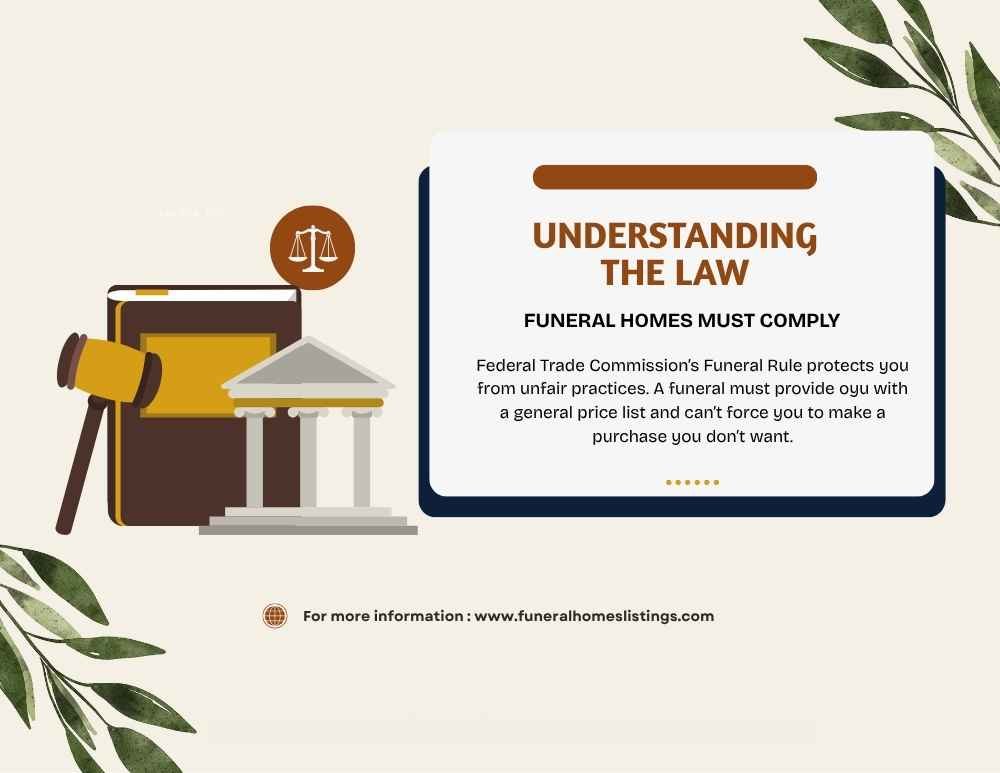
The Federal Trade Commission’s Funeral Rule protects you from unfair practices. Here’s what funeral homes must do:
Required Disclosures
- Provide itemized price lists before showing you merchandise
- Explain that embalming is usually not required by law
- Offer inexpensive cremation containers when traditional caskets aren’t wanted
- Allow you to buy caskets and urns from other sources without charging extra fees
Your Rights
- See prices first: Get written price lists before making decisions
- Buy only what you want: No one can force you to buy unwanted services or products
- Shop elsewhere: Buy caskets, urns, and flowers from other retailers if they’re cheaper
- Ask questions: Get clear explanations of all charges
How to choose a Funeral Home
Before You Visit Funeral Homes
- Contact at least three funeral homes for price comparisons
- Don’t mention your budget upfront
- Ask for their general price list over the phone
- Consider what services are most important to your family
When You Visit
- Request itemized pricing for everything
- Ask about less expensive alternatives
- Don’t feel pressured to decide immediately
- Consider buying caskets, urns, or flowers elsewhere
For funeral planning, remember that taking time to compare options can save you thousands of dollars. If you need help choosing a funeral home, search for.a funeral home on this website and focus on finding providers who respect your budget and wishes.
Planning Ahead Makes Everything Easier
Pre-planning isn’t just about money, though it does help financially. When you plan ahead:
- You lock in current prices and avoid inflation
- Your family knows exactly what you wanted
- Decisions get made calmly, not during emotional crisis
- You can research options and compare prices properly
The key is communicating your plans clearly to family members and putting important details in writing. For more guidance, check out our comprehensive funeral planning guide and learn about what to do immediately after a death occurs.
For families dealing with loss, grief support resources can provide emotional help during this difficult time.
Understanding Your Options for Final Arrangements
Different types of final arrangements affect both cost and personal preferences. For a detailed comparison of available choices, our guide on funeral disposition options explains burial, cremation, and alternative methods.
Remember that understanding the funeral rule and your consumer rights protects you from unfair practices and helps ensure you get fair pricing.
Moving Forward with Confidence
Dealing with funeral costs during grief feels overwhelming, but you have more options than you might realize. Whether you choose traditional services, alternative arrangements, or a combination of approaches, the key is making informed decisions that work for your family’s needs and budget.
Remember that you have rights, options, and people willing to help.
Start by understanding what you’re actually required to pay for versus what’s optional. Use your consumer rights to compare prices and avoid unnecessary expenses. And don’t try to handle everything alone, community support, government benefits, and financing options exist specifically to help families through this difficult time.
Take your time. Ask questions. Don’t let anyone pressure you into decisions that don’t feel right. Your family’s financial stability matters too, and your loved one would want you to make smart choices.
You’ll get through this. And when you do, you’ll have helped your family navigate one of life’s most difficult experiences with dignity and care.
Claire brings over 15 years of experience in end-of-life planning and funeral coordination. Before joining FuneralHomesListings.com, she worked directly with hundreds of families across the Midwest, helping them navigate difficult decisions with clarity and care. Her mission is to simplify the funeral planning process so families can focus on what matters most—honoring their loved ones.
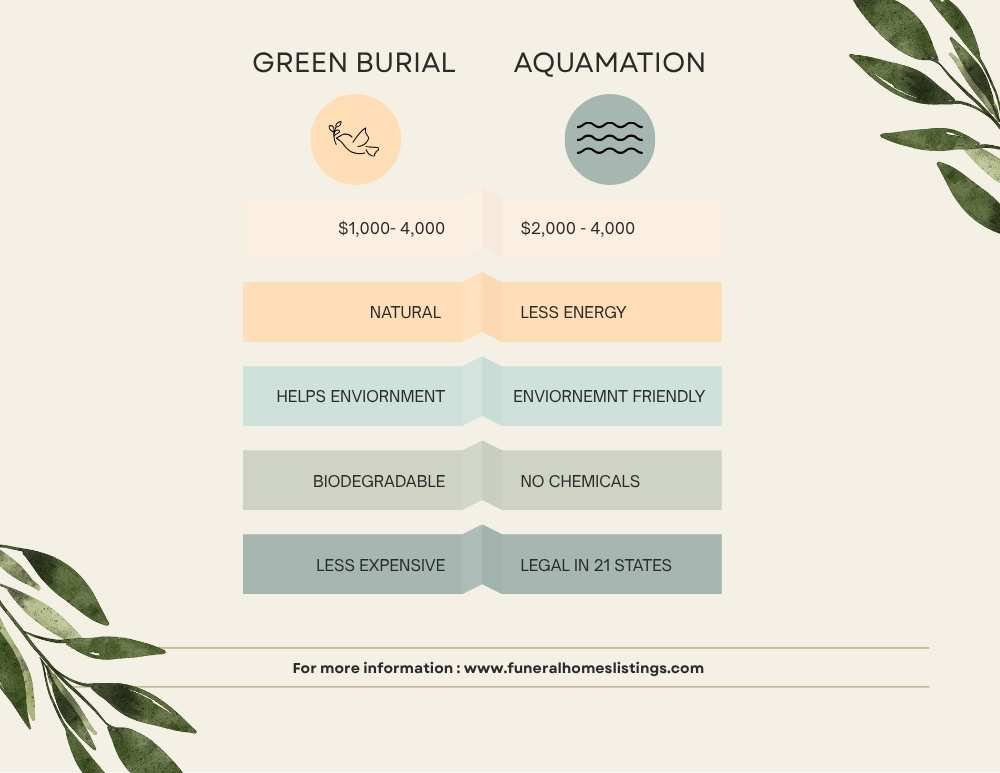
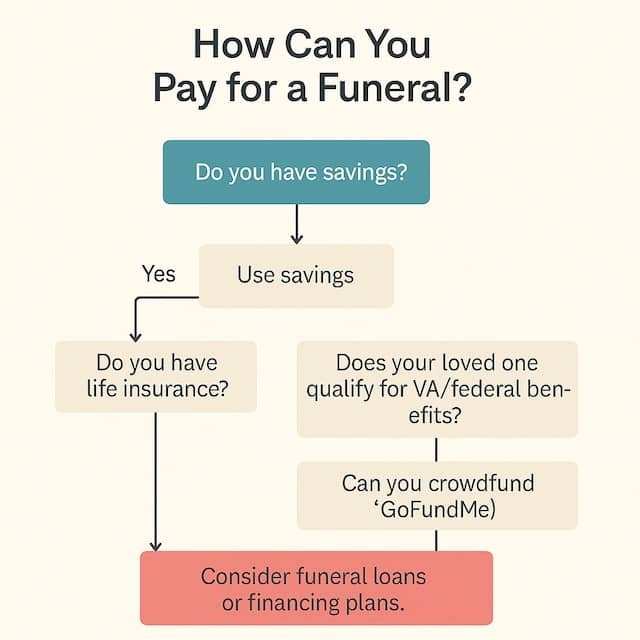
Comments